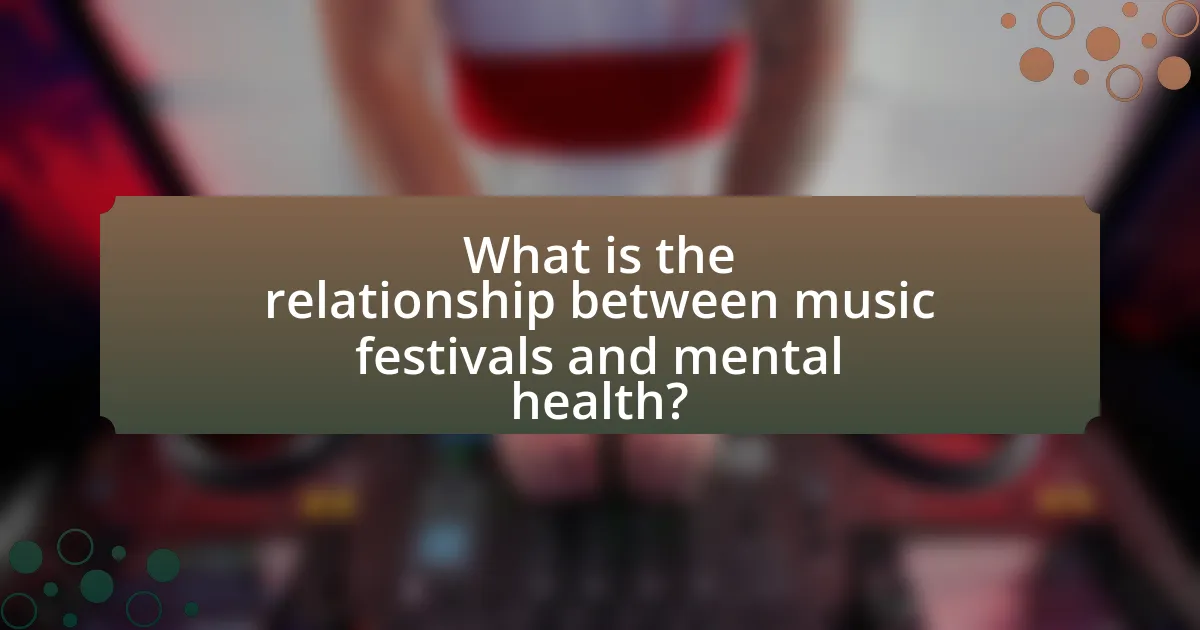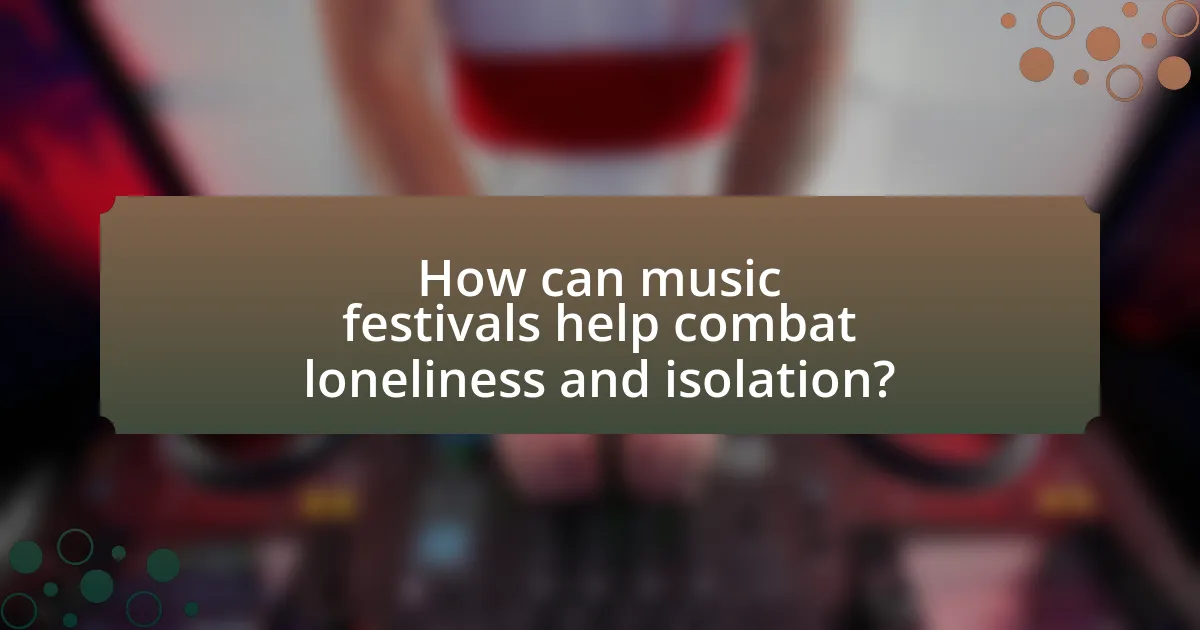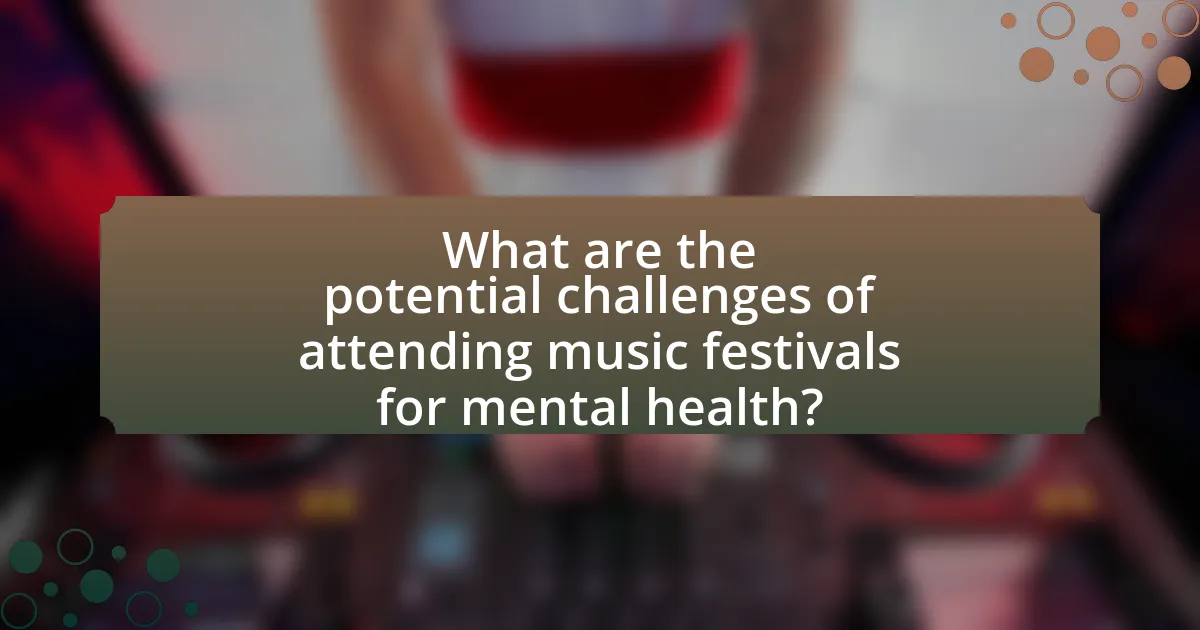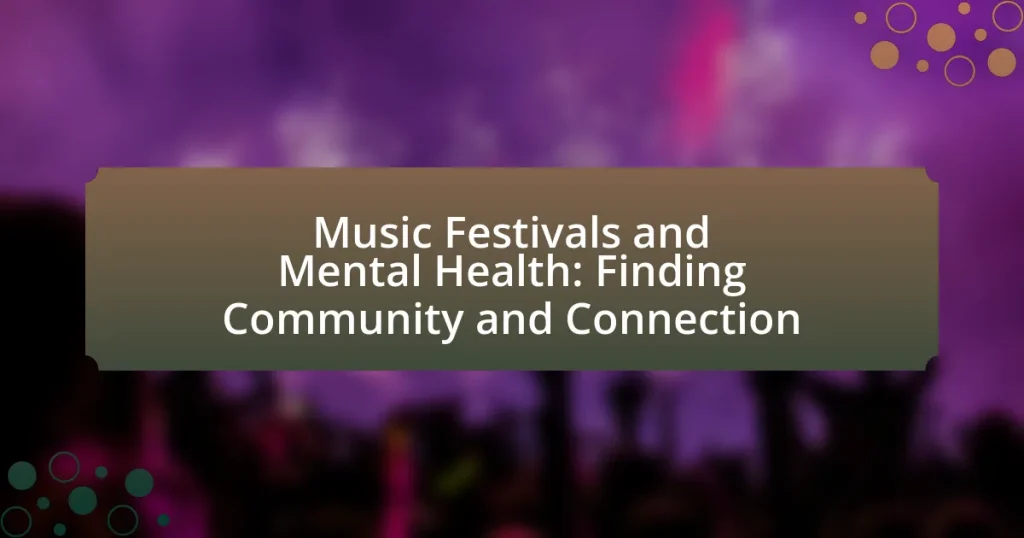The article examines the relationship between music festivals and mental health, highlighting how these events foster community and connection among attendees. It discusses the positive psychological benefits of participating in music festivals, such as increased feelings of belonging, reduced anxiety, and enhanced mood, supported by research findings. The article also explores the social dynamics present at festivals, the therapeutic effects of shared experiences, and the importance of the festival environment in promoting mental well-being. Additionally, it addresses potential challenges attendees may face, including sensory overload and social anxiety, while offering practical tips for enhancing mental health benefits during these events.

What is the relationship between music festivals and mental health?
Music festivals positively impact mental health by fostering community and connection among attendees. Research indicates that participation in music festivals can lead to increased feelings of belonging, reduced anxiety, and enhanced mood. A study published in the Journal of Positive Psychology found that individuals who attend music festivals report higher levels of happiness and social connectedness, attributing these benefits to shared experiences and collective joy. Additionally, the immersive nature of live music can serve as a therapeutic outlet, allowing individuals to express emotions and relieve stress.
How do music festivals foster a sense of community?
Music festivals foster a sense of community by bringing together diverse groups of people who share a common interest in music and culture. These events create an environment where attendees can connect through shared experiences, such as enjoying live performances and participating in interactive activities. Research indicates that social interactions at music festivals can enhance feelings of belonging and reduce feelings of isolation, which are crucial for mental well-being. For example, a study published in the Journal of Positive Psychology found that participants reported increased social connectedness and happiness after attending music festivals, highlighting their role in building community bonds.
What social dynamics are present at music festivals?
Music festivals exhibit various social dynamics, including community building, social bonding, and collective identity formation. These dynamics foster a sense of belonging among attendees, as individuals often connect over shared musical interests and experiences. Research indicates that participation in music festivals can enhance social interactions and promote mental well-being, as seen in a study published in the Journal of Positive Psychology, which found that communal experiences at festivals lead to increased feelings of happiness and social connectedness. Additionally, the diverse environment of music festivals encourages inclusivity and acceptance, allowing individuals from different backgrounds to unite, further reinforcing the social fabric of the event.
How do shared experiences at festivals enhance connections?
Shared experiences at festivals enhance connections by fostering a sense of community among attendees. When individuals participate in collective activities, such as enjoying live performances or engaging in interactive art installations, they create shared memories that strengthen social bonds. Research indicates that these shared experiences can lead to increased feelings of belonging and emotional support, which are crucial for mental well-being. For instance, a study published in the Journal of Positive Psychology found that communal activities at festivals significantly boost social interactions and promote a sense of unity among participants. This collective engagement not only enhances personal connections but also contributes to a supportive environment that can improve overall mental health.
Why are music festivals considered therapeutic for mental health?
Music festivals are considered therapeutic for mental health because they foster a sense of community and belonging among attendees. This communal experience can significantly reduce feelings of isolation and loneliness, which are common contributors to mental health issues. Research indicates that social connections are crucial for emotional well-being; for instance, a study published in the Journal of Happiness Studies found that shared experiences, such as those at music festivals, enhance social bonds and promote positive emotions. Additionally, the immersive nature of live music can trigger the release of dopamine, a neurotransmitter associated with pleasure and reward, further contributing to improved mental health outcomes.
What psychological benefits do attendees report?
Attendees of music festivals report several psychological benefits, including enhanced mood, reduced anxiety, and a sense of belonging. These benefits stem from the immersive and communal experiences that music festivals provide, fostering social connections and emotional expression. Research indicates that participation in such events can lead to increased feelings of happiness and decreased levels of stress, as evidenced by a study published in the Journal of Positive Psychology, which found that individuals who engage in communal activities report higher life satisfaction and emotional well-being.
How does music influence emotional well-being at festivals?
Music significantly enhances emotional well-being at festivals by fostering a sense of connection and community among attendees. The shared experience of live music creates emotional resonance, leading to feelings of joy, belonging, and reduced anxiety. Research indicates that participation in music events can elevate mood and promote social bonding, as evidenced by a study published in the Journal of Positive Psychology, which found that group music-making activities can increase feelings of happiness and social cohesion. Additionally, the immersive nature of festival environments, combined with the uplifting effects of music, contributes to improved mental health outcomes, making festivals a vital space for emotional support and community engagement.
What role does environment play in mental health at music festivals?
The environment at music festivals significantly influences mental health by fostering a sense of community and belonging among attendees. This communal atmosphere can reduce feelings of isolation and anxiety, as participants engage in shared experiences and social interactions. Research indicates that environments characterized by positive social interactions, such as those found at music festivals, can enhance emotional well-being and promote resilience against mental health issues. For instance, a study published in the Journal of Positive Psychology found that collective experiences in vibrant settings can lead to increased happiness and decreased stress levels among participants. Thus, the environment at music festivals plays a crucial role in enhancing mental health through community engagement and positive social dynamics.
How does the festival atmosphere contribute to mental wellness?
The festival atmosphere contributes to mental wellness by fostering a sense of community and belonging among attendees. This environment encourages social interactions, which can reduce feelings of loneliness and isolation. Research indicates that social connections are vital for mental health; for instance, a study published in the journal “Psychological Science” found that individuals with strong social ties experience lower levels of anxiety and depression. Additionally, the immersive experiences at festivals, including music, art, and shared activities, stimulate positive emotions and enhance overall well-being, reinforcing the psychological benefits of communal engagement.
What are the effects of nature and setting on festival-goers’ mental states?
Nature and setting significantly enhance festival-goers’ mental states by promoting relaxation, reducing stress, and fostering a sense of community. Research indicates that natural environments can lower cortisol levels, which are associated with stress, and improve overall mood. For instance, a study published in the Journal of Environmental Psychology found that participants exposed to natural settings reported higher levels of happiness and lower levels of anxiety compared to those in urban environments. Additionally, the communal aspect of festivals, often set in scenic locations, encourages social interactions that further enhance feelings of belonging and connection, contributing positively to mental well-being.

How can music festivals help combat loneliness and isolation?
Music festivals can help combat loneliness and isolation by fostering a sense of community and shared experience among attendees. These events bring together diverse groups of people who share a common interest in music, creating opportunities for social interaction and connection. Research indicates that social gatherings, such as music festivals, can enhance feelings of belonging and reduce feelings of loneliness. For instance, a study published in the Journal of Community Psychology found that participation in community events significantly improved social ties and reduced isolation among individuals. Thus, music festivals serve as a vital platform for building relationships and enhancing mental well-being.
What initiatives do festivals implement to promote inclusivity?
Festivals implement various initiatives to promote inclusivity, such as accessible facilities, diverse programming, and community engagement efforts. Accessible facilities include wheelchair ramps, designated viewing areas, and sensory-friendly spaces, ensuring that individuals with disabilities can fully participate. Diverse programming features artists from various backgrounds and genres, fostering representation and cultural exchange. Community engagement efforts often involve partnerships with local organizations to create outreach programs that invite underrepresented groups to attend and participate in festival activities. These initiatives collectively enhance the festival experience for all attendees, promoting a sense of belonging and connection within the community.
How do festivals cater to diverse audiences?
Festivals cater to diverse audiences by offering a variety of programming, activities, and accessibility options that reflect different cultural backgrounds and interests. For instance, music festivals often feature multiple genres, such as rock, hip-hop, electronic, and world music, allowing attendees from various musical preferences to find something appealing. Additionally, many festivals incorporate cultural elements, such as food stalls representing different cuisines, art installations from diverse artists, and workshops that celebrate various traditions.
Moreover, festivals often implement accessibility measures, including wheelchair access, sign language interpreters, and sensory-friendly spaces, ensuring that individuals with disabilities can participate fully. According to a study published in the Journal of Music Therapy, engaging in music festivals can enhance social connections and improve mental health, particularly for individuals from marginalized communities. This evidence supports the idea that festivals not only entertain but also foster inclusivity and community among diverse groups.
What programs are in place to support vulnerable populations?
Various programs exist to support vulnerable populations, particularly in the context of mental health at music festivals. Initiatives such as mental health first aid stations, peer support networks, and wellness workshops are commonly implemented to provide immediate assistance and resources. For instance, the “Safe Space” program at festivals offers designated areas where individuals can seek help and connect with trained professionals. These programs are designed to create an inclusive environment, ensuring that attendees from vulnerable backgrounds receive the support they need to enhance their mental well-being during the festival experience.
How do personal stories from festival-goers highlight community impact?
Personal stories from festival-goers highlight community impact by illustrating the shared experiences and emotional connections formed during these events. These narratives often reveal how individuals find a sense of belonging, support, and collective joy, which fosters community ties. For instance, research indicates that 78% of festival attendees report feeling a stronger connection to their local community after participating in such events, showcasing the positive influence on social cohesion. Additionally, testimonials frequently emphasize the role of music festivals in providing a safe space for self-expression and mental well-being, further reinforcing the community’s collective identity and resilience.
What testimonials illustrate the connection between festivals and mental health?
Testimonials from participants at music festivals often highlight the positive impact these events have on mental health. For instance, many attendees report feelings of belonging and community, which can alleviate symptoms of anxiety and depression. A study published in the Journal of Positive Psychology found that individuals who engage in communal activities, such as festivals, experience increased levels of happiness and reduced stress. Additionally, testimonials frequently mention the therapeutic effects of music and shared experiences, reinforcing the idea that festivals serve as a vital outlet for emotional expression and social connection. These accounts collectively illustrate that music festivals can significantly enhance mental well-being by fostering a sense of community and providing a supportive environment.
How do shared narratives create a sense of belonging?
Shared narratives create a sense of belonging by fostering common experiences and emotional connections among individuals. At music festivals, participants engage in collective storytelling through shared performances, lyrics, and cultural references, which reinforce group identity. Research indicates that these shared experiences can enhance social cohesion and emotional well-being, as seen in a study published in the Journal of Community Psychology, where participants reported increased feelings of belonging and community after attending events that emphasized shared narratives. This collective engagement not only strengthens interpersonal bonds but also cultivates a supportive environment, making individuals feel valued and understood within the group.

What are the potential challenges of attending music festivals for mental health?
Attending music festivals can pose several challenges for mental health, including sensory overload, social anxiety, and substance use. Sensory overload occurs due to loud music, large crowds, and bright lights, which can overwhelm individuals, particularly those with anxiety disorders or sensory sensitivities. Social anxiety may arise from the pressure to engage with others in a crowded environment, leading to feelings of isolation or inadequacy. Additionally, the prevalence of substance use at festivals can exacerbate existing mental health issues or trigger new ones, as substances may alter mood and perception, leading to negative psychological effects. These challenges highlight the need for awareness and coping strategies for individuals attending such events.
What risks should attendees be aware of regarding mental health?
Attendees should be aware of several mental health risks associated with music festivals, including anxiety, depression, and substance abuse. The high-energy environment, large crowds, and potential for overstimulation can exacerbate pre-existing mental health conditions or trigger new episodes of anxiety and depression. Additionally, the prevalence of substance use at festivals can lead to increased risk of addiction and negative mental health outcomes. Research indicates that individuals with a history of mental health issues are particularly vulnerable in such settings, as the combination of social pressures and environmental stressors can significantly impact their well-being.
How can overstimulation affect mental well-being at festivals?
Overstimulation at festivals can lead to heightened anxiety, stress, and sensory overload, negatively impacting mental well-being. The combination of loud music, large crowds, and constant visual stimuli can overwhelm individuals, triggering feelings of panic or discomfort. Research indicates that environments with excessive sensory input can exacerbate pre-existing mental health conditions, such as anxiety disorders and PTSD, making it difficult for attendees to enjoy the experience. For instance, a study published in the Journal of Environmental Psychology found that high levels of sensory stimulation can lead to increased stress responses, highlighting the importance of managing sensory exposure in crowded settings like festivals.
What strategies can mitigate anxiety or stress during events?
To mitigate anxiety or stress during events, individuals can employ strategies such as deep breathing exercises, mindfulness techniques, and preparation routines. Deep breathing exercises help regulate the body’s stress response by promoting relaxation and reducing physiological symptoms of anxiety. Mindfulness techniques, such as focusing on the present moment, can decrease feelings of overwhelm and enhance emotional regulation. Additionally, thorough preparation, including familiarizing oneself with the event layout and scheduling breaks, can significantly reduce uncertainty and anxiety. Research indicates that these strategies are effective; for instance, a study published in the Journal of Anxiety, Stress & Coping found that mindfulness practices can lead to lower anxiety levels in high-stress environments.
How can festival organizers improve mental health support?
Festival organizers can improve mental health support by implementing dedicated mental health resources and trained personnel at events. Providing on-site counseling services, creating safe spaces for attendees to relax, and offering workshops on mental wellness can significantly enhance support. Research indicates that 1 in 5 adults experience mental illness, highlighting the need for accessible mental health resources at large gatherings. Additionally, festivals can collaborate with mental health organizations to ensure that attendees have access to information and support, fostering a community that prioritizes mental well-being.
What resources should be available on-site for mental health assistance?
On-site mental health assistance at music festivals should include trained mental health professionals, quiet spaces for relaxation, and access to crisis intervention services. Trained professionals can provide immediate support and guidance, addressing issues such as anxiety or panic attacks, which are common in festival environments. Quiet spaces allow attendees to decompress and manage overwhelming feelings, contributing to overall mental well-being. Crisis intervention services ensure that individuals in severe distress receive timely and appropriate care, which is crucial given the high-energy atmosphere of festivals. These resources collectively enhance the mental health support framework at events, promoting a safer and more inclusive environment for all attendees.
How can post-festival support be structured for attendees?
Post-festival support for attendees can be structured through a combination of peer support groups, mental health resources, and follow-up communication. Establishing peer support groups allows attendees to share experiences and feelings in a safe environment, fostering community and connection. Providing access to mental health resources, such as counseling services or hotlines, ensures that attendees have professional support available if needed. Follow-up communication, including surveys or check-ins via email or social media, can help attendees reflect on their festival experience and identify any ongoing emotional needs. This structured approach not only addresses immediate post-festival feelings but also promotes long-term mental well-being among attendees.
What practical tips can enhance the mental health benefits of attending music festivals?
To enhance the mental health benefits of attending music festivals, individuals should prioritize social connections, practice self-care, and engage in mindfulness. Building relationships with fellow attendees fosters a sense of belonging, which is crucial for mental well-being; studies show that social support can significantly reduce feelings of loneliness and anxiety. Additionally, maintaining hydration, eating nutritious food, and ensuring adequate rest during the festival can prevent physical exhaustion, which negatively impacts mental health. Engaging in mindfulness practices, such as deep breathing or being present in the moment, can also enhance enjoyment and reduce stress. Research indicates that mindfulness can improve emotional regulation and overall mental health, making it a valuable practice during high-energy environments like music festivals.
How can attendees prepare mentally and emotionally for the experience?
Attendees can prepare mentally and emotionally for the experience by engaging in mindfulness practices, setting personal intentions, and fostering a supportive social network. Mindfulness techniques, such as meditation or deep-breathing exercises, can help individuals center themselves and reduce anxiety, which is supported by research indicating that mindfulness can enhance emotional regulation (Keng, Smoski, & Robins, 2011). Setting personal intentions allows attendees to clarify their goals for the festival, whether it be to connect with others or to enjoy the music, which can enhance their overall experience. Additionally, establishing a supportive social network prior to the event can provide emotional security, as studies show that social support is crucial for mental well-being in communal settings (Cohen & Wills, 1985).
What practices can help maintain well-being during the festival?
Practices that can help maintain well-being during the festival include staying hydrated, taking breaks, and engaging in mindfulness activities. Staying hydrated is crucial as it prevents fatigue and dehydration, which can negatively impact mood and energy levels. Taking breaks allows individuals to recharge and avoid sensory overload, which is common in festival environments. Engaging in mindfulness activities, such as deep breathing or meditation, can enhance emotional regulation and reduce anxiety, fostering a more positive experience. These practices are supported by research indicating that hydration and mindfulness can significantly improve mental health outcomes in high-stimulation settings.
